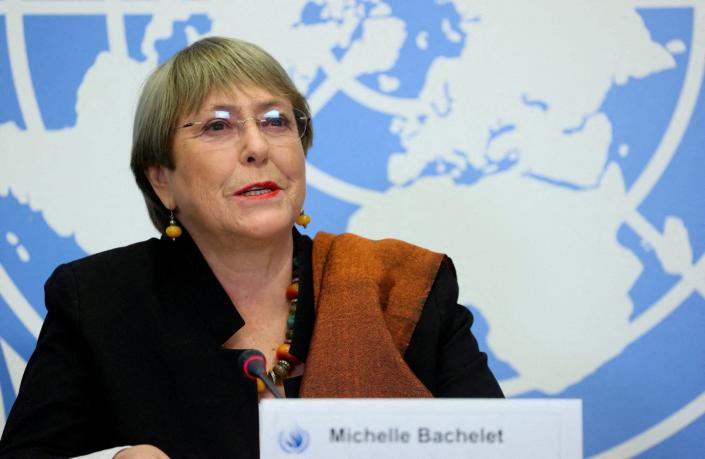Western governments and activists have demanded that United Nations human rights chief Michelle Bachelet finally releases a long-awaited report into Xinjiang after her visit to China last week.
But the South China Morning Post has learned its release is unlikely to be imminent. Instead the report will be updated with “our interactions and observations from the visit”, Elizabeth Throssell, a spokeswoman for Bachelet’s office confirmed.
Once it is finalised, it will be shared with the Chinese authorities for factual comments before publication, she added.
Do you have questions about the biggest topics and trends from around the world? Get the answers with SCMP Knowledge, our new platform of curated content with explainers, FAQs, analyses and infographics brought to you by our award-winning team.
Former employees and observers of the agency said this process could take several weeks or even months, allowing for the time needed to translate it into up to six languages and depending on the political will of the Office of the United Nations High Commissioner for Human Rights (OHCHR) and the Chinese government.
This raises questions about whether it will be ready in time for the next meeting of the UN Human Rights Council, which starts on June 12 and runs until July 8 – a demand made by some campaigners.
Speaking to Western diplomats in China last week, Bachelet had hinted that a second report based on her six-day trip would be written. But the agency confirmed that only a single report will be published and would not specify when.


UN human rights chief Michelle Bachelet visited China last week. Photo: Reuters alt=UN human rights chief Michelle Bachelet visited China last week. Photo: Reuters>
“While it is reasonable to update the long-delayed report, it cannot be a cause for any further delays and the report must reflect the scale and gravity of human rights violations being committed by the Chinese government,” said Alkan Akad, a China researcher at Amnesty International.
The Chinese government has been accused of forced sterilisation and the mass internment of Uygurs and other Muslim minorities. Some governments, including the United States, have accused China of committing genocide in Xinjiang, a charge strongly denied by Beijing.
Chinese officials have denied human rights abuses in Xinjiang, saying the internment camps are vocational training centres to tackle radicalisation and terrorism.
The report, which Bachelet said was being finalised late last year, has become a political hot potato that has left the UN caught between China and the West.
Bachelet’s visit to China, which was hailed as a roaring success by Beijing and roundly criticised by some in Europe and the United States, has prompted a renewed focus on its release.
Britain, Germany and the European Union have all called for the prompt release of the report, which is based on voluminous interviews and remote monitoring.
The growing body of evidence surrounding Xinjiang has itself become politically contentious.
Defenders of Beijing say that much of it derives from governments and researchers that are hostile to China, but Western governments believe the UN report – which one EU source described as a potential “game changer” – will provide indisputably independent evidence of abuses in the region.
The Post reported in January that the Chinese government stipulated that for any visit to go ahead, the report must not be released in advance.
“We still expect the high commissioner to publish the announced report on the human rights situation in Xinjiang – including the findings from the remote monitoring – as soon as possible,” German Foreign Minister Annalena Baerbock said in a statement.
A statement from Britain’s foreign office said “we look forward to the high commissioner’s long-awaited report on the situation in Xinjiang”.
EU foreign affairs spokeswoman Nabila Massrali said she “encourages the Office of the UN High Commissioner for Human Rights to release the already announced, remote-monitoring report on the human rights situation in Xinjiang as a matter of priority”.
The EU also “regretted that the high commissioner’s access to independent civil society organisations, human rights defenders and detention centres was limited, and that this did not allow her to assess the full scale of political re-education camps in Xinjiang”.
Brussels will get a full debrief from Bachelet next week during a strategic dialogue between the OHCHR and the EU.
The Chinese mission to the EU hit back with a Chinese language statement on its website on Tuesday.
“The arrangements of High Commissioner Bachelet’s activities during her visit to China were made according to her own wishes and through full consultation between the two parties,” the statement read.
“Bachelet also said at a press conference that there were extensive and unsupervised exchanges during her visit to China. It is not true that the European side’s so-called high-level visit is restricted.”
Speaking at an online press conference in Guangzhou on Saturday, Bachelet said she had visited a prison and one of the centres but was not able to “access the full scale” of these “vocational education and training centres”.
“I raised with the government the lack of independent judicial oversight of the operation of the programme … allegations of the use of force and ill-treatment in institutions, and reports of unduly severe restrictions on legitimate religious practices,” Bachelet said.
She also called on Beijing to review its counterterrorism and anti-radicalisation policies to make sure that they complied with international human rights standards.
“In the Xinjiang Uygur autonomous region, I have raised questions and concerns about the application of counterterrorism and deradicalisation measures and the broad application, particularly the impact on the rights of Uygurs and other predominantly Muslim minorities,” she said.
Bachelet said her trip was not intended as an investigation and she had “unsupervised” access to meetings the UN had arranged for her in Xinjiang. She also described her visit as an opportunity for “candour” with China’s leaders.
“To those who have sent me appeals, asking me to raise issues or cases with the authorities, I have heard you,” she said. “I will continue to follow up on such issues and instances of concern on a sustained basis.”
This article originally appeared in the South China Morning Post (SCMP), the most authoritative voice reporting on China and Asia for more than a century. For more SCMP stories, please explore the SCMP app or visit the SCMP’s Facebook and Twitter pages. Copyright © 2022 South China Morning Post Publishers Ltd. All rights reserved.
Copyright (c) 2022. South China Morning Post Publishers Ltd. All rights reserved.




